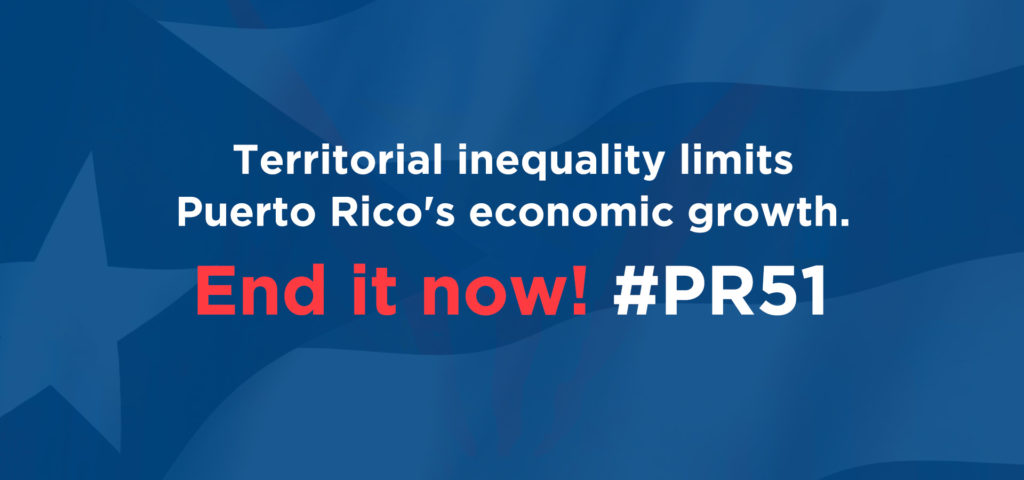
Puerto Rico’s current territory status limits economic development, creates a lower quality of life and has pushed hundreds of thousands of U.S. citizens in Puerto Rico to relocate stateside. New U.S. Census data shows that Puerto Rico’s population fell by roughly 12% in the last decade alone. People have been leaving for the states at a very high rate, both before and after Hurricane Maria.
A Ticking Time Bomb
A recent piece in the Washington Times states that the dramatic population loss in Puerto Rico is “a ticking time bomb.” The piece argues that this population loss is absolutely devastating for the island’s economy because it diminishes the consumer base, tax base and the workforce, and increases per capita debt. “Puerto Rico’s catastrophic population loss cannot be stopped without ending the unequal and discriminatory territory status. It is impossible to even begin to develop Puerto Rico to its full economic potential without having clarity on the legal and constitutional context in which its economy will exist in the future.”
Territory Status Hurts America’s Economy
This also hurts the economy stateside because Puerto Rico has approximately $70 billion in annual interstate commerce. A significant decrease in population and ongoing economic stagnation in Puerto Rico means that fewer goods and services can be purchased from the states, negatively impacting jobs and profits for stateside companies. Yet economic underperformance is not uniquely attributable to Puerto Rico as a territory; indeed all U.S. territories have underperformed and been in arrested development compared to after they became states.
Idea that Puerto Rico Must Fix its Economy, and Only Then Can Discuss Statehood Gets It Backwards
While some argue that Puerto Rico must fix its economy before statehood can be considered, economic history shows that territories unable to pay their way in the Union became more able to pay their own way after admission and full economic integration. The current territory status is preventing Puerto Rico from converging with the national economy and creating a failed territorial client state that fosters debt and dependence. Without statehood, Puerto Rico will never evolve sufficient economic strength to converge with the mainland economy. From an economic perspective Puerto Rico will only qualify for statehood by being made a state.
Voters in Puerto Rico Rejected Territory Status and Chose Statehood
Seeking a better future for themselves and their families a majority of voters in Puerto Rico rejected continuing as a territory and chose statehood in each of the 2012, 2017, and 2020 plebiscites. Polls in the states and on the Island continue to show that statehood is the most popular option for Puerto Ricans and for Americans in general.
Now the members of the House Committee on Natural Resources are on the verge of taking action to address this century-old issue. After two hearings held earlier this year on H.R. 1522, The Puerto Rico Statehood Admissions Act, Chairman Raul Grijalva has said that he intends to hold a mark-up session possibly as soon as this month.
Statehood Would Mean an Economic Boom for Puerto Rico
As the U.S. Government Accountability Office recognized in a recent report, statehood would encourage investment by providing businesses with a familiar, standard, certain, and permanent legal position, as well as long-term security.
The congressional investigative arm noted another consequence of statehood that should help grow Puerto Rico’s economy: much greater national attention to, consciousness of, and understanding of Puerto Rico. It would be equally covered in all private as well as public programs instead of often being left out. The examples of the two states most recently admitted into the Union, Alaska and Hawaii, showed how much of a difference this can make. Both saw double digit economic growth in the decades after they became states.
Statehood would Strengthen the American Economy
The Federal treasury would benefit from Puerto Rico statehood because businesses and individuals from the states would not be able to avoid income taxes through Puerto Rico. Multinational corporate entities and the wealthy would pay their fair share to support the government that helps make their incomes possible. This would mean billions of dollars a year for the U.S. Treasury.
Congress can no longer ignore the cost to the Federal and state governments of the failing territory economy which requires ever increasing federal transfers as opposed to being self-sustaining under statehood. Statehood has been an economic boost for every territory that has become a state so far, and many were in much worse positions than Puerto Rico is now.
Unleashing Puerto Rico’s full economic potential under statehood would significantly boost consumer demand and interstate commerce between the island and other states. This would support the growth of businesses and jobs both in Puerto Rico and all states that it engages in interstate commerce with.
Call to Action – Pass H.R. 1522 Now!
All Members of the House Natural Resources Committee that believe in limiting excessive government regulation over state and local governments, that believe in free market solutions and expanding economic opportunities as opposed to maintaining a failed territory governing structure that fosters economic underdevelopment and dependency must support and vote to pass H.R. 1522. For the good of Puerto Rico and America as a whole!

